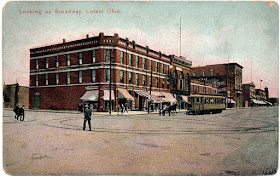 |
| Vintage postcard circa 1907 |
This article from the Elyria Republican of August 9, 1907 mentions the removal of the Loop as one of the proposed improvements to be undertaken by the streetcar company.
But it was not until 1919 that the removal of the Loop actually happened. This article on the front page of the April 4, 1919 Lorain Times-Herald noted that track removal would be starting soon.
And on June 12, 1919, this article on the front page of the Lorain Times-Herald noted the historical significance of what was happening.
The article observed, “For a quarter of a century the loop at Broadway and Erie-av has been the city’s principal storm center. It has caused political quarrels and score of franchise controversies.
“This morning a gang of workmen began tearing up the rails of the loop and it is no more. Cars are being run to West Erie-av and are being turned on the Y near the interurban station.
“Before many hours all that will be left of the loop will be the trolley wires over heard and they will soon come down. A Y at the intersection of the streets will replace the loop and cars will be run to a new loop in north Broadway.”
The passing of the Loop even made the pages of the Elyria Evening-Telegram on June 13, 1919.
****
Although its tracks have been gone for more than a hundred years, the Loop lives on in the memories and vernacular of longtime Lorain residents and local historians.
It will be interesting to see if newer residents of the city perpetuate this nickname. Or is it already dead?
Perhaps some savvy restaurant owner at or near that intersection will revive the name.
It will be interesting to see if newer residents of the city perpetuate this nickname. Or is it already dead?
Perhaps some savvy restaurant owner at or near that intersection will revive the name.
****
I did a Then & Now post on the Loop back in 2016 here, with some of the same postcards, but without the historical perspective. 



Lorain should've put a trolley line back in the middle of Broadway.Then that would be another "sight" to see and ride in Lorain.I could run from 21st St down Broadway and turn around or "loop" at the intersection of East Erie and Broadway again....What is old is new again.
ReplyDeleteInteresting post Dan. It's pretty amazing, and speaks to the impact of the streetcar lines in Lorain's history, that after 100 years "the loop" still identifies the intersection of Broadway and Erie Avenue. Of course during its time and for some years after its removal, businesses perpetrated the name by identifying their location as being "at the loop" or "near the loop". Still, It's pretty amazing that more than a hundred years after removal something as mundane as a streetcar turn around can still identify an area to local residents. I remember when I was younger my grandparents still sometimes referred to areas not by address, but by stop number. My grandparents used to refer to the area around Clearview school as Penfield Junction, and their conversations would contain location identifiers, not by address, but by saying "they lived out by Stop 7". Even these references were more than 30 years after the demise of the streetcars.
ReplyDeleteHi Rick! Another one would be “the Devil’s Elbow,” which is where Broadway and Elyria Avenue meet by the former Journal building; my mom still calls it that.
ReplyDeleteFor years, the iconic "Loop News" newsstand, with the flame-thrower cigar lighter at the entrance, was a Downtown landmark.
ReplyDeleteDan,
ReplyDeleteI noticed in the Elyria Republican article of 8-9-07 a comment about the 'Tenth Avenue Subway'. Looking at the Google satellite pics, 10th and Broadway looks to be about four hundred feet north of the railroad tracks - does that mean there was a plan to go under the tracks at that time?
Mike
Hi Mike, I think that the Tenth Avenue in question is actually the old name for E. 28th Street, and the subway is referring to the underpass there.
ReplyDeleteAbout a year after the 1907 article, Lorain's whole street renaming and renumbering proposal was introduced and the South Lorain numbered streets (tenth, eleventh, twelfth, etc.) had new numbers.